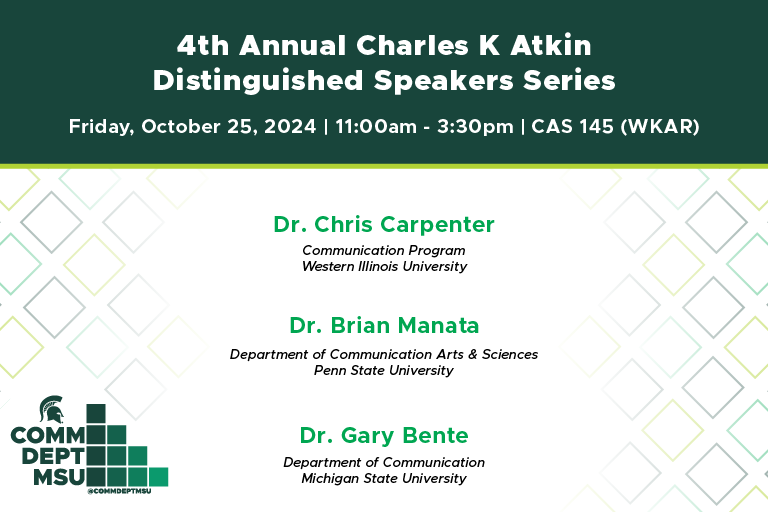Join us in CAS 145 (WKAR) for our annual Charles K. Atkin Distinguished Speakers Series.
This year’s speakers include:
11:00 a.m. | Dr. Chris Carpenter, Communication Program, Western Illinois University
19 YEARS OF SUPERDIFFUSER RESEARCH
Abstract: Traditional models of opinion leadership sought to identify and measure the single core trait that would predict interpersonal diffusion success. The superdiffuser model proposed that someone who would be successful at diffusing attitude and behavior change actually possesses three conceptually distinct traits: being a connector, a persuader, and a maven (a maven on a relevant topic). Subsequent research has focused on how to identify superdiffusers, understanding what they do, and developing methods for superdiffuser-based interpersonal diffusion campaigns. I will review the progress in those areas and then discuss recent expansion of the model and new directions in superdiffuser interventions.
Bio: Christopher J. Carpenter (PhD, MSU 2010) is a Professor in the School of Communication and Media at Western Illinois University. He researches opinion leadership, motivated reasoning, and observing others on social media. He has published over 65 journal articles and co-authored two books. He received the John E. Hunter Meta-Analysis Award (2017) and the award for top researcher at his university (2016).
1:30 p.m. | Dr. Brian Manata, Department of Communication Arts & Sciences, Penn State University
ON THE PROBLEM OF COHESION IN GROUPS
Abstract: Many organizations have transitioned to a group-based structure of organizing, whereby groups of individuals are expected to organize and perform effectively. Although groups can be decidedly productive, they can also fail and perform poorly. As such, scholars have focused a considerable amount of effort on attempting to understand the conditions under which group effectiveness is facilitated. This talk will focus on the role of group cohesion in this process. Dr. Manata will discuss a series of studies that raise broad questions about the dimensionality of the cohesion construct and some of the different factors—such as group conflict and leadership behaviors—that are expected to impact group cohesion.
Bio: Brian Manata (PhD, Michigan State University, 2015) is an Assistant Professor in the Department of Communication Arts and Sciences at Pennsylvania State University, University Park, USA. His research program focuses primarily on the study of workgroup dynamics and leadership behaviors. He is also interested in problems related to measurement. His work has appeared in Human Communication Research, Management Communication Quarterly, and the Annals of the International Communication Association.
3:00 p.m. | Dr. Gary Bente, Department of Communication, Michigan State University
THE VIRTUAL MIRROR. WHAT AVATARS CAN REVEAL ABOUT SOCIAL PERCEPTION AND NONVERBAL COMMUNICATION
Abstract: Humans are social animals, and our achievements and well-being are closely linked to our unique ability to communicate and coordinate our minds and actions with others (Tomasello, 2014). While language undoubtedly plays a crucial role in human communication, it is not the sole means through which we interact and form connections with and impressions of others. Nonverbal communication, involving movements, gestures, gaze, and facial expressions, constitutes a subtle yet potent mechanism of social influence that goes beyond words. Although receiving considerable research attention during the last five decades, it appears that many of the secrets of nonverbal communication have not been unraveled yet. This becomes particularly evident when trying to synthesize appealing nonverbal communication skills in artificial systems such as robots and AI agents. This talk aims to demonstrate how virtual characters can be utilized as a research tool to better understand the subtle mechanisms of nonverbal communication, and to generate the knowledge necessary for the creation of believable artificial humans.
Bio: Gary Bente is Professor in the Department of Communication at Michigan State University and the director of the Center for Avatar Research and Immersive Social Media Applications (CARISMA). Before joining MSU in 2017 he was professor in Social and Media Psychology at the University of Cologne (Germany) and for many years editor in chief of the Journal of Media Psychology. His research focuses on nonverbal communication dynamics in social interactions using Virtual Reality and avatar technologies as methodological tools.
